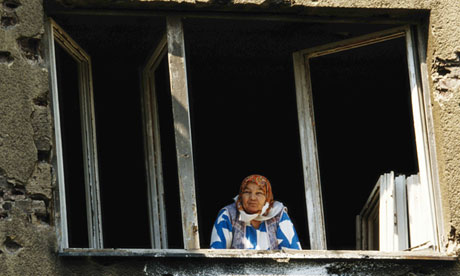 |
| "A woman peers from the window of her bullet-riddled flat in the Grbavica district of Sarajevo, Bosnia, during the war." (Tom Stoddart Archive/Getty Images) |
By Julian Borger
The Guardian, April 4, 2012
"In the last heavy storm of the winter, so much snow built up on the roof of Skenderija, one of Sarajevo's most important commercial centres, that it caved in, crushing cars, offices and shops. The cause was evident: no one had got round to clearing the roof until it was too late. Nonetheless, the authorities blamed the war. Bosnia's war, which brought the worst atrocities Europe had seen since the Nazi era, began 20 years ago on Thursday. It has been over for more than 16 years, in which time the country has been more peaceful that even the optimists dared hope. Yet it continues to haunt the blighted country -- as a constant excuse for dysfunction, as a bitter memory, a psychic scar and a malaise. At the anniversary of the conflict the internationally enforced peace settlement still holds, but there is little else to celebrate. Bosnia is more divided now than two decades ago. Intermarriage between the three principal ethnic groups -- Muslim Bosniaks, Catholic Croats and Orthodox Serbs -- is far less common that it was before the war, and children in Bosnia's two constituent entities, a Bosniak-Croat federation, and a Serb republic (Republika Srpska) are now growing up with minimal contact with each other. The once cosmopolitan capital, Sarajevo, is now almost monolithically Bosniak.
One of the dwindling number of exceptions, General Jovan Divjak, an ethnic Serb who defied the sectarian logic in 1992 to lead the defence of Sarajevo against Serb nationalist forces, summed up the prevailing mood. 'The hate is worse now than it was just after the war. It's not getting better. It's getting worse,' he said despondently. One of the few bright spots in the gloomy approach to the war's 20th anniversary has come from an unexpected corner. The men who took up arms to fight each other in 1992 have lately become exemplars of collaboration across the 'inter-entity line'. The bad news is that they been brought together by the country's poverty. The soldiers' plight is a typical story of contemporary Bosnian politics. In 2010, the parliament decreed that all soldiers over 35 on both sides of the line should be pensioned off, but failed to pay them their pensions because squabbles over which ethnic group should control which ministry prevented the formation of the government for the next two years. The Bosniak-Croat federation scraped together about £150 a month for their veterans, but the Serb republic refused, leaving its soldiers, who it once glamorised as holy warriors, destitute. The only people to lift a finger to help them were the men they once fought against. 'Who better than those who were in the trenches, the people who were shooting each other, to lead the way?' said Semsadin Pojata, a former Bosniak sergeant who fought in the besieged enclave of Gorazde during the war, and who led a fundraising drive for the Serb veterans. 'If we can do it, why not students, why not governments? And no one can accuse [us] of disloyalty. No one has more right to do this than the warriors.' Pojata, who now lives on the banks of the Miljacka river, near the old front line in eastern Sarajevo, appealed to federation veterans and says 90% responded with a donation of £4 or more. He then got in touch with a Serb veterans leader, Rade Dzeletovic, to help find the most needy cases. 'We all share the same problems -- struggling to survive,' Dzeletovic said by phone from the town of Zvornik. 'No one can label us as traitors, as we are the ones who fought the war. That, however, is in the past. It does not mean we have to forget what has happened, but we need to look into the future. The war is over. We all have children to take care of.' [...]"














No comments:
Post a Comment
Please be constructive in your comments. - AJ